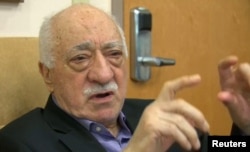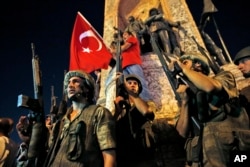How the Turkish government deals with the aftermath of the July 15 attempted military coup could have lasting implications for U.S.-Turkish relations, according to some U.S. foreign policy experts.
Turkey, as a North Atlantic Treaty Organization member, is a valuable ally of the United States. According to Michael Rubin of the American Enterprise Institute, however, if Ankara backslides even further on democracy, rule of law and human rights, Turkey could become an ally much more in the mold of Pakistan, which has little in common with Western values, and where bilateral frictions, mistrust and recriminations are commonplace, even though both countries depend on each other for regional stability.
After the failed coup attempt, many observers are concerned that Turkish President Recep Tayyip Erdogan will further tighten his grip on power, purge the military and be more controlling of democratic processes in the country. While President Erdogan’s rule was widely seen as authoritarian in style, most of the international community nonetheless condemned the military coup attempt and declared support for Turkey’s democratic institutions. But if Erdogan uses the coup as justification for further crack-down, this sympathy could evaporate.
Less than 24 hours after the attempted coup started, President Erdogan appeared on live television at a rally in Istanbul, declared he was in control of the government, and said he was ready to take on the Gulenists, whom he said have caused much pain to Turkey.
Erdogan then publicly asked U.S. President Barack Obama to extradite Fethullah Gulen to Turkey. Gulen is a 75-year-old Turkish cleric residing in self-imposed exile in Pennsylvania since 1999. “If we are strategic partners, or model partners, do what is necessary,” said the Turkish president. In response, U.S. Secretary of State John Kerry said that U.S. authorities would investigate and issue a judgment against Gulen if Turkey submits evidence of wrongdoing.
Many arrests
In the meantime, thousands of military personnel, including flag officers, have already been arrested, more than 2,700 judges have been suspended, and some 140 arrest warrants have been issued against members of Turkey's Supreme Court.
As the coup attempt was unfolding, the West showed unequivocal support for Turkish democracy. Executive Director of the McCain Institute for International Leadership and former U.S. Ambassador to NATO Kurt Volker believes “this [support] will give Erdogan some running room to establish order and security in the country” following the coup attempt.
He also stated that “Erdogan, who had already shown some very strong anti-democratic tendencies before this coup, will use it as a justification for cracking down on society even more.” This type of repressive governance could potentially lead to a “more restrictive environment in Turkey, less press freedom, less political openness.”
Michael Rubin, resident scholar at the American Enterprise Institute and a former U.S. Defense Department official, says the West is not going to be trapped by this stated support for democracy, if it the government cracks down.
“Going after the judiciary, going after the press is not going to be acceptable. The Europeans, Americans and others can say that they stood up against an illegal coup. However, they support the rule of law – and it can be violated either by the coup plotters or by the president of Turkey,” Rubin told VOA.
Volker does not think Turkey’s overall strategic goals would change. He therefore does not anticipate any major foreign policy cleavages with the United States in the short term. However, if human rights and rule of law are abused by the government, “in the long run, it will lead to frictions” with the West.
Delicate diplomacy
In light of a turbulent election year in the United States, as well as increased terrorist activities in Europe, Western leaders may be inclined to be less critical of Erdogan’s authoritarian rule in order to maintain stability in the region. “He may try to ride that wave of stability,” admitted Rubin. However, the United States “relying on a strongman in order to stabilize the region may be a short-term strategy.”
Rubin believes U.S.-Turkish relations are already changing and not for the better. “The United States is entering into a corollary situation to what we have with Pakistan. In that, we deal with anti-Americanism, which sometimes is incited by the government. At the same time, even though we recognize it’s a flawed ally, we do whatever we can to keep the relationship up regardless.”
Shortly after Erdogan demanded Gulen’s extradition from America, Turkish authorities grounded almost all U.S. military flights from Incirlik airbase. From this airbase, the U.S. military conducts its air raids in neighboring Syria against Islamic State. These flights are now paused. Officials claimed the need to protect the safety of Turkish airspace until all military aircraft ,which may have been used during the attempted coup, are accounted for. In addition, the Pentagon reported that commercial power to the base was cut, and Incirlik was operating on an internal power supply.
While it may be too early to say what may be the implications for U.S.-Turkish relations of the failed coup d’état in Turkey, steps such as these may suggest that Ankara has already started saber-rattling.







